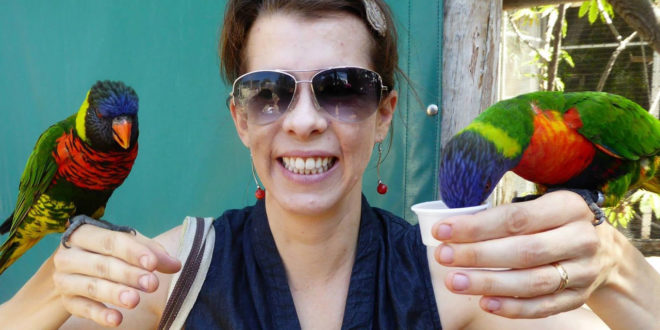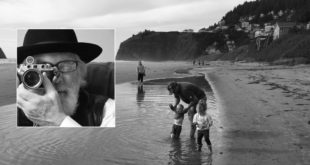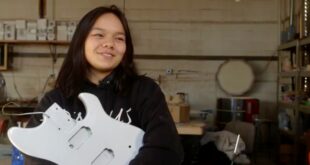We recently interviewed Sari Fordham, an Associate Professor of English at La Sierra University in Riverside, California.
Editor – Sari, you are a superb writer, whom I have followed since you wrote for the Adventist Review years ago. I love your writing style and find your copy easy to follow yet intellectually stimulating. So, how did you get into writing—to the point that you decided you wanted to pursue it as a career?
Fordham —Wow! Thank you. That made my day. So I got into writing the way I think most writers do: through reading. I read so much as a child that my teachers scolded me for reading in class, and my mother scolded me for reading instead of doing chores. When my mother and I visited her family in Finland, I enthusiastically discovered my aunt’s library. “But you could be reading anywhere,” my mother told me. And she wasn’t wrong. That love for reading transitioned into a love for writing when I taught in Thailand as a student missionary. I discovered I could use my words to take this very vivid experience and bring it to family and friends in my letters. When I returned to Southern Adventist University, where I attended, I took a creative writing class and discovered the pleasure of writing scenes, and I was hooked.
Editor – It is interesting to hear about the natural progressions that often usher people into their eventual life passions. All that reading turned you into a wordsmith, which is an exciting and delicate thing—to so arrange words they motivate, inspire, and instruct.
You have a book coming out in a few weeks. I believe this is your first one, which anyone in writing knows is a herculean feat. What was it like putting it together? How long did it take?
Fordham —The writing process fascinated me because I learned so much while researching. My memoir is about my childhood growing up in Uganda, and I wanted to give readers both a texture of my childhood and historical context. To that end, I read lots of books and newspaper articles, watched news programs from the 1970s, listened to press conferences, gathered family documents, transcribed over a hundred pages of letters, interviewed family members, etc. Not everything I discovered ended up in the book, but I benefited from having a bigger lens and then deciding what to include. It’s hard to identify how long I wrote the book—a long time, for sure—because I wasn’t working consecutively. I took time away from this project for other writing projects and life.
Editor – Whew! Many people don’t think of the research that goes into writing a well-documented article or book! Thank you for mentioning that. All of that research is what makes a project so interesting. As it seeps into the book, the details give it character and make it “stand on all fours.” As a university college professor, what is the biggest challenge that your students face when trying to complete their writing assignments?
Fordham —I really appreciate how you framed that question about students and writing assignments. I’m hearing from students that it’s hard to focus on complex writing projects when they’re worried about systematic racism, police violence, violence against the Asian American and Pacific Island communities, a pandemic, college debt, climate change, and so on. And yet, these same students sit down anyway and write amazing things. Every day, I’m impressed with students’ attentiveness to the world they inhabit and how they bring that observant eye into the stories and essays they submit.
Editor —I get it. Your students want to write about the emotions that consume them as they witness the crazy stuff happening across America. That makes sense. Writing about what you are intently focused on and have strong feelings about will undoubtedly be filled with emotion.
Let me switch gears. You teach creative writing at the college and university levels. I was scared to death of English when I arrived as a freshman on a college campus. I was afraid I would have to diagram sentences and get into the nitty-gritty of technical writing. On my first day in class, the teacher said, “We’re going to focus on ‘Freewriting,’ where you don’t have to worry about the rules of writing as much writing a compelling story about something you’ve experienced. We’re not going to do ‘English (traditional technical writing).'” Oh, my! I was so happy! Her class was amazing. I understand rules are there for a reason, but you can have an article that’s a perfect specimen of good grammar yet is devoid of emotion or heart. How do you inspire your students not to get hung up with the technicalities of writing? Maybe you put a lot of emphasis on the rules. Every teacher has a different approach.
Fordham —Your question is such a great one. On the one hand, we don’t fall into writing because of punctuation and grammar. Certainly, I didn’t. So when I teach writing, the content is always going to be the focus. Anyone can edit a sentence, but only you can write this story, this poem, this memoir. At the same time, because your story and poem are so important, it deserves to be told using various tools. A comma or a dash in just the right place can be powerful. As a writer, you don’t want to leave that power to an outside editor. I would also add that once you start submitting your work, your poem, your story, your memoir will be read by busy editors, and you’ll have a better chance at publication if the work you submit is polished. Most of my class time is focused on content, but I also teach how to edit one’s work.
Editor —That’s great! Those budding writers and poets who come to La Sierra University are in good hands. That is so good to know! I have a question about your new book, Wait for God to Notice. Congratulations! I’ve pre-ordered my copy and can’t wait to read it. There are a lot of people who want to write a book but never pull it off. It seems so overwhelming and daunting; they have trouble getting started. This is my last question. How did you make it happen? Do you have any tips for wannabe book authors?
Fordham —I love this question. Everyone has an amazing story. Your lived experience is powerful and important, and original. No one can write that story except you. But as you say, it’s daunting to sit down and start writing a book. Where do you begin? At your birth? At the birth of your parents? Grandparents? You can always go back further and find rich material. Or do you begin in the middle of a conflict and use that story to structure your narrative? If there are so many questions about starting, imagine how many you’ll encounter along the way. I say this not to discourage but recognize that writing is hard and encourage you to do it still.
I have three pieces of advice for hopeful writers, and I bet most readers of this interview have already accomplished at least one of them.
First, read books. Read the kind of books you want to write. The more you read, the more you absorb the sneaky things writers do.
Second, take a writing class. A lot of cities have a vibrant literary center that offers workshop classes to the community. In Riverside, we have Inlandia Institute, where community members take classes and get published in Inlandia anthologies. With COVID, many programs have moved to a virtual space, and I suspect there will continue to be virtual classes available after COVID is over. A writing class will help you gather the tools you need to write and will provide valuable feedback.
Finally, start with a writing project smaller than a book. My first publication was in Insight Magazine. I learned about audience and structure and character development on a much more manageable scale and got the thrill of seeing my piece published sooner rather than later. Both Spectrum Magazine and the Adventist Review accept submissions of personal essays and are particularly interested in stories that have a point or lesson.
Editor —Thank you, Sari, for sharing some of your story with us and inspiring us to want to be better writers.
Follow this link to order a copy of Sari Fordham’s book, Wait for God to Notice.
This interview was conducted by Rich DuBose, Director of the Adventist Society for the Arts.
© 2017 - 2024 ASA. All rights reserved. Click here for content usage information.



